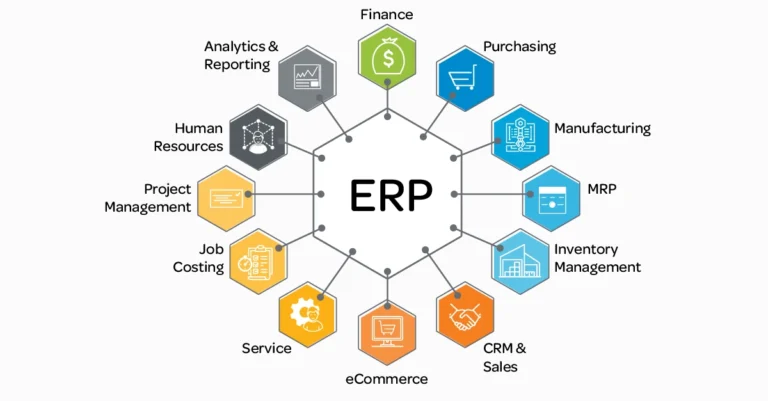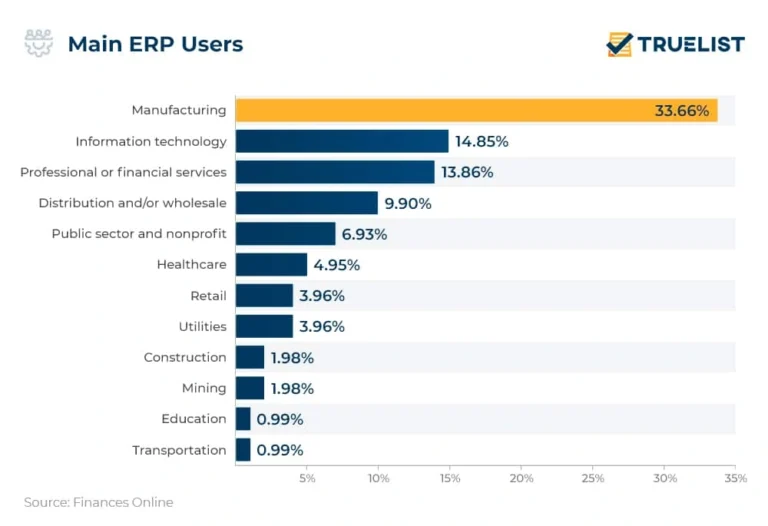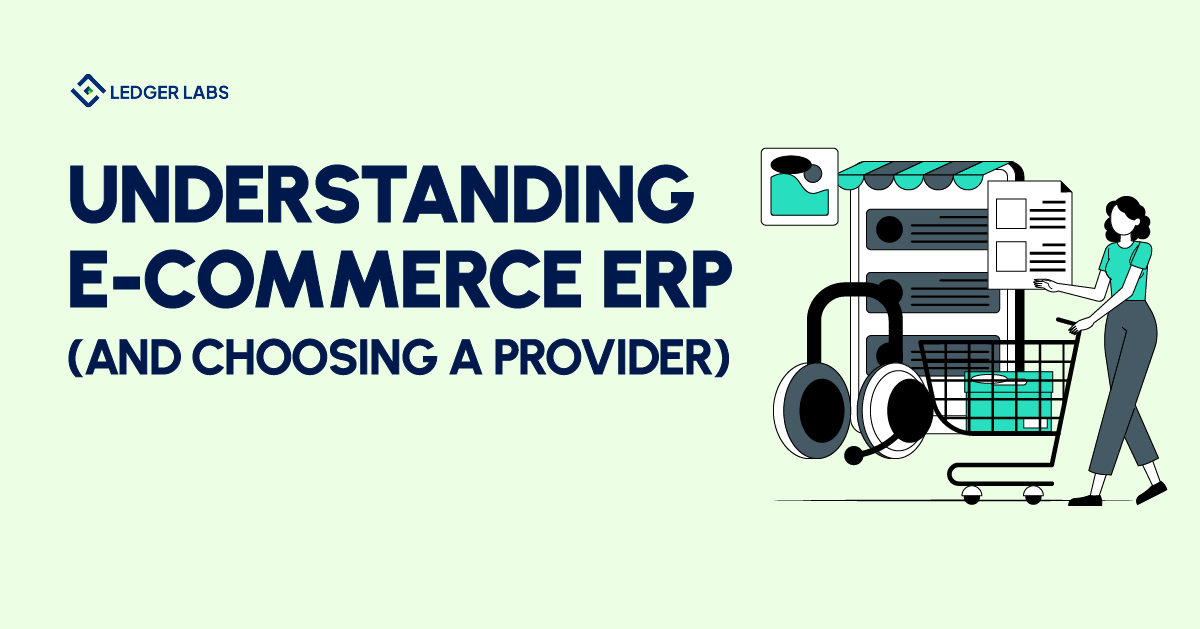1. 42% of e-commerce businesses use ERP systems, highlighting a significant growth opportunity for improved operational efficiency and integration compared to other industries like manufacturing, where adoption is higher.
2. Real-time inventory management with ERP systems ensures updates across platforms, reducing over-selling risks and improving customer satisfaction, especially for multi-channel e-commerce businesses.
3. ERP integration enhances customer profiling, streamlining data for personalized marketing and expanding product lines, driving customer retention and revenue growth for e-commerce stores.
4. NetSuite ERP multi-channel capability supports integration with platforms like Shopify, Amazon, and eBay, broadening reach and simplifying order and inventory management.
5. Amazon’s dominance in e-commerce is significant, accounting for 37.8% of U.S. sales, making its ERP integration a key priority for competitive online sellers.
6. ERP system selection should consider business size, budget, and operational complexity, with flexible API integrations providing advanced customization for large, complex operations.
Enterprise Resource Planning (ERP) refers to such systems and software that e-commerce businesses use to manage their core accounting processes.
47% of companies use ERP applications worldwide. North America holds the largest finance ERP share at $4.5 billion.
Having access to information is no longer an issue for e-commerce brands today. But, making sense of it and using it to their advantage is.
With the integration of an ERP solution, businesses face this challenge head-on.
ERP has improved businesses’ productivity by 20-30%. By reducing costs and generating new revenue streams, it can have a significant impact on your business.
In this article, we will understand the ERP system in detail and explore similar solutions that’d be fit for your business too.
What is ERP?

Enterprise Resource Planning (ERP) coordinates and streamlines your core business accounting functions.
It gathers and organizes data from all business units, empowering you with real-time visibility and informed decision-making.
It brings consistency and coherence to data across different channels. The channels include sales, accounting, procurements, and human resources.
In the e-commerce landscape, the ERP system helps track customer feedback. It’s done using the Customer Relationship Management (CRM). Some of the regular tasks include:
- Invoice generation
- Project management
- Support production and supply chain operations
- Mitigate risks
- Monitor and track financial transactions
An ERP system makes business activities more cost-effective, reducing administrative and operational costs.
So How Does an ERP System Work?
In the 1960s, most manufacturing companies depended on an MRP solution.
It helped them manage their inventories and offered immense relief to the workers in the production by figuring out raw materials and estimating how much quantity would be required.
It was instrumental in determining how much time the production would take.
This solution transformed into an ERP system, also known as MRP II. It took a step further, adding agility to not only manufacturing but also to other business units.

An ERP system is the engine of your business. It helps process data and provides solutions to optimize growth and control costs.
30% of businesses opt for ERP solutions to facilitate growth. They substitute outdated software that combats modern problems that debilitate growth and efficiency.
It mostly benefits larger enterprises, but SMEs rely on this solution as well. The reason is simple – they want to expedite growth by making data-driven decisions.
The best part about an ERP solution is its dashboard. It provides real-time information, letting you access and track it from your smartphone.
Advantages of ERP
An ERP system like Netsuite ERP Integration has a clear objective. It’s to centralize operations, tackle inefficiencies, and boost success with innovative solutions.
It helps with managing inventory, improving customer satisfaction, and securing data.
By increasing visibility, it gives e-commerce business owners the ability to make faster but more informed decisions.
Here are some more advantages that can motivate you to incorporate an ERP system into your company:
- Get real-time financial insights
- Secure confidential data and store it in one place
- Cut IT costs
- Streamline business processes and enhance collaboration between different business units
- Make data-driven decisions
- Improve accuracy in inventory and sales data
- Assign one place for reporting and data analytics
- Support the efforts of supply chain management
Get professionals help for all your accounting needs
Types of ERP Systems Your Business Can Implement
The right ERP can help you increase productivity and improve customer experience personalization.
But, not all ERPs are equal. There are three types to know, specifically if you’re new to ERP.
Choosing the right ERP will have a significant impact on your experience.
1. On-premise ERP
This is a type of ERP integration in which the company owns the data hub. This option is ideal for larger organizations as they have the resources to support its maintenance.
The on-premise ERP is preferred by companies that are hesitant to go to the Cloud. This system is for both internal and external use and has a one-time license fee.
But this type of integration can take months or even years. Not only would it necessitate a full-time administrator, but it also offers limited usage for e-commerce businesses.
With on-premise ERP, the company has to maintain and secure its integration with the servers. It gives you the security of storing your data within the premises, something Cloud doesn’t.
2. Cloud-Based ERP
The world is choosing cloud-based solutions for almost everything. Almost 64.5% of companies prefer cloud-based ERP systems while only 35.5% go for on-premise software.
E-commerce companies mostly use Cloud ERP solutions. ERP providers manage them at data centers.
This type of integration follows a subscription pricing model. It is cheaper compared to the on-premise structure. It doesn’t need any in-house IT support or software developers as well.
Cloud-based ERP is ideal for e-commerce businesses. This system gives quick access to marketplaces like Shopify. Other benefits include:
- Scalability option
- Quick deployment
- Responds to changes
- Integration with third-parties
3. Hybrid ERP
The hybrid approach brings the best of both worlds. So, the confidential financial records are kept on-premise, using the on-premise ERP system.
Meanwhile, the core functions enjoy the agility and flexibility of a Cloud-based ERP. Most e-commerce businesses find the balanced approach to be more effective.
A Panorama report says 20.8% of businesses opt for a hybrid approach to help them with data relocations.
While the hybrid ERP solution lets you protect and store sensitive information in-house, it also benefits from the disaster recovery benefits offered by Cloud.
Security and resilience should sit alongside cost and integrations when choosing ERP. For teams adopting cloud or hybrid ERP, establish incident-readiness covering identity misuse, API abuse, and third‑party outages. This cloud incident response guide outlines what to log across cloud services, how to detect and investigate suspicious activity, and the steps for containment and recovery. Embedding such a runbook with your ERP rollout reduces downtime risk and helps satisfy compliance by documenting playbooks, owners, and escalation paths.
Things to Consider Before Choosing the Right ERP System
97% of companies are considering implementing a cloud-based ERP solution. But before you settle for one, analyze what your business needs.
Here are some key considerations. They will help you decide the best ERP system for your business.
1. Purpose and Business Objectives
Every company is different and has unique needs.
Yet, cost saving is among the top three ERP objectives for 46% of businesses.
So, how do you decide if an ERP solution is right for your company? Well, there will be signs.
- a) Does your company have different software or systems for every process?
- b) Is your business information hard to access?
- c) Is the accounting system time-consuming and exhausting?
- d) Are your customers always or usually dissatisfied with their experience?
- e) Is your IT infrastructure inefficient?
If you said yes to most of the questions above, then it’s time for you to put in place an ERP system in your company.
It’s time you outline the problems you’re currently facing to decide whether this is the right solution.
2. Calculate the ROI
A common problem that most business owners undergo is that measuring ROI through your ERP system isn’t easy.
But it doesn’t have to be difficult either.
One of the best ways to calculate the ROI on your ERP is by considering and comparing the following:
- a) Employee productivity
- b) Headcount
- c) Inventory improvement
- d) Manufacturing efficiency
Keep in mind the differences between on-premise and cloud ERP systems.
While cloud-based ERP is user-friendly, with financial information protected off-site, the on-premise ERP demands extra support from the in-house staff for maintenance.
3. Do You Have Time and Resources?
30% of organizations choose ERP to manage their finances.
But the same rule doesn’t apply to anybody.
If your company size is too small and you’ve just begun, getting an ERP system may not be ideal. You have to take baby steps to get to a position where you can think about expansion and bringing agility.
Setting up an ERP system could be expensive. So, you have to see if you have the money to invest at this point in your business.
If you opt for an on-premise solution, it might take months or even years to deploy. Not to forget, it’s the most expensive one.
So consider your business objectives. Make sure they align with your plans moving ahead.
4. Seek References
Before you approach any ERP service provider, it’s best to get recommendations from people who have the same goals as you.
Do you have any specific ERP provider in mind?
See if they’ve any extra costs apart from their subscription fees. Determine if they meet deadlines. Find out what tools they use. Also, see if they provide high-quality service and products.
You can even ask your vendor about their clientele. This way, you can make sense of their authenticity.
5. Outline Key Business Functions
Now this part is important.
You must know why exactly you’re choosing to implement an ERP system in your company. What is it exactly that you want to fix or rectify?
It is easy to get influenced by market trends and take the plunge. But what if your business is fine just the way it is?
So the best thing you can do is outline your objectives and narrow down the pain points. What problems are you facing? Make a list and do your search. Find out if it’s the best solution for the listed problems.
Top ERP Software Solutions
It could be difficult to choose one ERP software solution when you have so many options available.
So what’s the best for you?
Well, it depends upon your requirements.
1. Shopify
Shopify is an e-commerce platform for online and retail stores. It is extremely successful as it allows you to not only create but personalize your online shop.
You can integrate the Global ERP Program from the Shopify App Store.
It gives real-time, updated inventory and helps you accurately track product and order information.
You can also check out customer data to improve their buying experience.
And don’t worry, your data is completely secure as you don’t have to link it to third parties.
Some popular Shopify features include:
- Easy setup for dropshipping
- Access to customer profile
- Analytics to gauge customer insights and sales data
- Solid SEO tools
- Access through smartphone
2. NetSuite
Ranked as the top cloud-based ERP solution, Oracle, NetSuite ERP offers several e-commerce functionalities.
It streamlines financial and human resources tasks. Almost 24,000 companies believe in this ERP solution.
This platform is customizable and can also be linked with third parties via API. It is regularly updated, but you don’t have to pay any extra fee.
Some of its features include:
- Accounting software
- Inventory management
- Enterprise performance management
- Access to compliance and reporting tools
Recommended: 10 NetSuite ERP implementation tips for running of your small business smoothly
3. Brightpearl
Brightpearl is an ideal solution for online retailers. It works as an on-premise solution and offers in-built Shopify integrations.
You can get real-time updates from your inventory and manage it more efficiently. All the processes, like financial reporting and order management, are automated.
You can use several options to help you improve your financial reporting. Ultimately, it’s going to reflect how your business performs.
Some of its features include:
- Multichannel integration
- CRM
- EDI integration
- Financial management
- Order support and management
Let’s start working on the financial health of your company.
The Bottom Line
The right ERP system will streamline your business operations.
It will boost productivity and even aid in cost reduction.
No matter how complicated your books may seem, I can help you figure out a way to streamline your accounts and develop a solid ERP system.
With 12+ years of accounting experience, our bookkeeping experts at Ledger Labs have the right tools to help e-commerce businesses effectively tackle accounting problems and understand accounting tools and integrations.












